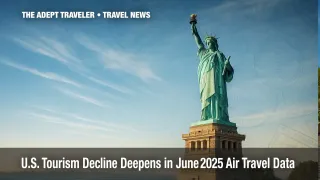U.S. Tourism Decline Deepens in June 2025 Air Travel Data

The U.S. tourism decline is accelerating just as the summer peak begins. Fresh numbers from the National Travel and Tourism Office (NTTO) for June 2025 show total U.S.-international air traffic at 25 million passengers-1 percent lower than the same month last year, yet still ahead of 2019. The damage centers on inbound travel: international visitor arrivals were 6.6 percent lower year-over-year, while Americans heading abroad nudged 0.2 percent higher. Together with weakening North America air travel demand flagged by IATA, the slide suggests policy headwinds are starting to bite.
Key Points
- Why it matters: inbound travelers spend more than $5,000 per visit.
- International visitor arrivals fell 6.6 percent in June.
- Outbound U.S. travel rose 0.2 percent, 20 percent above 2019.
- Canada-to-U.S. traffic plummeted 4.9 percent, the steepest major-market drop.
- WTTC projects a $12.5 billion loss in 2025 visitor spending.
U.S. Tourism Decline Snapshot - How It Works
NTTO's I-92 program tracks monthly arrivals and departures using airline manifest data and DHS records. For June 2025, it counted 25.03 million passenger movements across U.S. borders. Non-U.S. citizens arriving by air totaled 4.88 million, down 6.6 percent year-over-year and 12 percent below June 2019. By contrast, 9.9 million U.S. citizens departed for foreign destinations, edging 0.2 percent above last year and a full 20 percent ahead of the 2019 benchmark. Route-pair weakness was broad: Mexico (-1.4 percent), Canada (-4.9 percent), the United Kingdom (-5 percent), Germany (-1.6 percent), and the Dominican Republic (-2.2 percent) all went negative.
U.S. Tourism Decline Background - Why It Matters
Before the pandemic, inbound tourism injected more than $233 billion annually into the U.S. economy, supporting one in ten travel-sector jobs. COVID-19 wiped out over half of that revenue in 2020, and the rebound has lagged key competitors in Europe and Asia. Although domestic leisure demand roared back in 2022, international visitor arrivals only reached 84 percent of 2019 levels by late 2024. The latest pullback threatens to stall the recovery. A stronger U.S. dollar, lengthier visa waits, and shifting geopolitical perceptions have already pushed Canada and Europe to reconsider holiday plans. Without renewed growth in international visitor arrivals, gateway cities risk lost jobs in hospitality, retail, and transportation.
U.S. Tourism Decline Latest Developments
A string of new data releases in the past month provides the clearest picture yet of summer headwinds.
NTTO's June Air Passenger Report Signals Inbound Weakness
Preliminary NTTO figures put June traffic at 25 million passengers, with inbound volumes down nearly seven percent despite competitive airfare deals. Capacity constraints did not cause the dip; available seats on international routes were flat. Analysts point to a widening perception gap: stricter entry screening and political rhetoric have made some travelers feel less welcome, prompting them to choose Europe or Asia instead. Border-adjacent airports from Buffalo to Bellingham are already reporting quieter arrival halls.
North America Lags in IATA's Global Metrics
IATA's May 2025 market analysis found global revenue-passenger-kilometers up five percent year-over-year. North America air travel demand was the lone decliner, slipping 0.5 percent overall and 1.7 percent domestically. The U.S. remains the world's largest single aviation market, so its softness acts as a drag on global averages. IATA economists blamed economic uncertainty and weaker corporate travel budgets, but flagged policy uncertainty as a growing factor in international bookings.
Economic Fallout From Policy Backlash
The World Travel & Tourism Council warns that recent tariff threats, tightened immigration rules, and talk of annexing locations such as Greenland are dampening sentiment abroad. Its May 2025 Economic Impact Research estimates the United States could forfeit $12.5 billion in international visitor spending this year, making it the only one of 184 countries analyzed expected to post an outright decline. Canadian media have amplified calls for a "travel pause," and European tour wholesalers report elevated cancellation rates for U.S. itineraries.
Analysis
For travelers, the immediate impact is subtle but real. Fewer inbound tourists mean shorter lines at major attractions, particularly mid-week, and better room availability in New York, Orlando, and Las Vegas. Hoteliers are pivoting to domestic promotions, offering bundled parking and dining credits to entice weekend getaways. Airlines may shift wide-bodies from trans-Atlantic service into stronger South American or Asian routes, raising the odds of last-minute schedule changes. Currency moves also play a part: a strong dollar erodes foreign purchasing power, yet boosts outbound buying power for Americans. Advisors should highlight price advantages abroad-especially in the Eurozone-while counseling clients to lock in refundable rates in case carriers trim frequencies. Businesses reliant on meetings and conventions should budget for flatter international attendance through at least Q4 2025.
Final Thoughts
Travel advisors can help soften the U.S. tourism decline by championing smoother entry experiences and promoting under-the-radar destinations that welcome foreign guests. Encourage international clients to apply for visas early and enroll in trusted traveler programs to minimize airport friction. Domestically, highlight shoulder-season deals and remind leisure travelers that lighter crowds translate into richer experiences. Finally, stay alert to policy shifts; even small changes to tariffs or entry rules can quickly reshape demand in the volatile recovery ahead. For deeper planning guidance, read our internal primer on choosing the right travel advisor.
